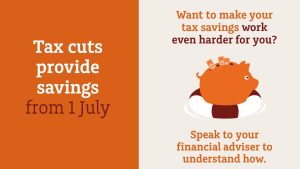When you hear the term ‘savings’ you probably think of the extra money you have in a bank account. But there’s so much more to savings than simply depositing more money into your accounts than you take out.
Money & Life contributors draw on their diverse range of experience to present you with insights and guidance that will help you manage your financial wellbeing, achieve your lifestyle goals and plan for your financial future
Taking a structured, strategic approach to saving can not only help you achieve your financial goals in the future, it can make managing your day-to-day spending less stressful. Here are five tips to help you save money:
1. Get serious about budgeting
If you’re truly serious about spending less, you need to commit to living within a budget. The key is to try and view budgeting not as a set of restrictions and rules, but a framework for making financial decisions easier by taking out the guesswork.
But before you get all excited to organise your money and start trying one of the many methods of budgeting out there, you need to understand where your money is actually going now.
Make a list of your ‘hard costs’ – rent/mortgage, utilities, food staples, fees and regular bills – and then track your spending, keeping a list of where you’re spending money each day. There are many free apps and online tools available to help make tracking as easy and painless as possible.
By putting your spending under the microscope, especially the little ways that money seems to disappear, with a coffee here and there, or an unplanned evening out – you get an honest and truthful understanding of your spending habits.
This shouldn’t send you into a guilt spiral about your daily cappuccino habit. Look at it as an opportunity to understand what really matters to you, so you can plan your budget accordingly. If brunch with your best friends every weekend is important to you, then make sure you put aside some income to cover that. If you need a caffeine injection every morning, but its hitting your pocket hard, can you make your coffee at home or at the office and cut that line of expenditure out?
2. Change bad buying behaviour
If you’ve struggled with sticking to a budget in the past, you might have some behaviours you need to change. Every balanced budget should allow for some fun. However, the trick is to keep in check any random shopping motivated purely by impulse. By being sales savvy, especially at Christmas time when the ‘urge-to-splurge’ is more compelling, you’ll avoid undoing all the spending discipline you’ve demonstrated throughout the year.
One way to help break bad spending habits is to actually take the focus away from money and make an emotional connection. Set some clear and attainable goals, and take time to regularly focus on how achieving them will make you feel, whether it’s paying down the home loan sooner and finally owning your home, taking that first step off the plane when you arrive at your dream holiday destination, or starting the ignition for the first time in your new car.
3. Clear credit card debt
Paying off the minimum monthly amount may appear to be a painless way to deal with credit card debt.
However, due to interest charges (ranging from between 10% to 20%-plus) and late-payment fees, taking this minimalist approach will only allow your credit card debt to compound. The net effect is that even modest debt, could if left unchecked, become substantial debt over time.
One way to cover monthly credit card debt is to set up a direct debit payment. But if you simply don’t trust yourself with a credit card, then it might be time to cut it up.
You should also be careful of overdrafts on your existing accounts. You might be able to squeeze an extra $50 out of your EFTPOS card by relying on overdraft, but this just reinforces the habit of spending more than you have, and there are often overdraft fees that can add up each month. Those fees – even if they’re only $5 – are unnecessary outgoings.
4. Have dedicated savings accounts
Dedicated savings accounts set you up for success, and peace of mind.
Opening a high interest savings account that is separate from all your accounts – perhaps with another bank – gives you a tangible separation between your savings and your active money. Try to put any cash windfalls, such as tax returns or bonuses, into that account before you have a chance to touch. Equally important, don’t underestimate the power of compounding returns – a fundamental component of wealth creation – to accelerate your savings at a much faster rate over time.
And make sure you have an emergency fund. It sounds intimidating, but you should aim to have enough in that account to cover six months of living expenses (including housing costs) so you’ve got a safety-net in the event of losing your job, becoming ill, or any other major life event that will disrupt your income.
Similarly, if you have a home loan, it’s worth considering combining it with the benefits of an offset, redraw or line of credit facilities. These features may come at a higher cost, but by allowing you to put extra money into your loan, they can reduce the amount of interest you pay.
5. Look for little ways to save money every day
We all have favourite brands that we prefer, but try to be more flexible with items you’re not as attached to. Consider buying in bulk or choosing house brands for frequently used items to make little savings regularly.
Then take a look at your recurring expenses, big and small. Are there some subscriptions you can do without? With interest rates continuing to go lower, it’s worth seeing if you can refinance your home loan at a lower rate. Take the time to speak with your insurance and utility providers and shop around for better deals on gas and electricity; plus house, health and car insurance. Remember, every dollar you save, by renegotiating these recurring expenses, can go directly into your savings.
To avoid any bill shocks, you can also check with your utility providers about ‘bill smoothing’ which allows you to pay your account fortnightly or monthly, instead of paying it in one
This article has been been reproduced from here.
Disclaimer: The views expressed in this publication are solely those of the author; they are not reflective or indicative of Financial Services Partners position and are not to be attributed to Financial Services Partners. They cannot be reproduced in any form without the express written consent of the author. The information provided in this document, including any tax information, is general information only and does not constitute personal advice. It has been prepared without taking into account any of your individual objectives, financial situation or needs. Before acting on this information you should consider its appropriateness,
having regard to your own objectives, financial situation and needs. You should read the relevant Product Disclosure Statements and seek personal advice from a qualified financial adviser. From time to time we may send you informative updates and details of the range of services we can provide. If you no longer want to receive this information please contact our office to opt out. Financial Services Partners Pty Ltd ABN 15 089 512 587, AFSL 237590








